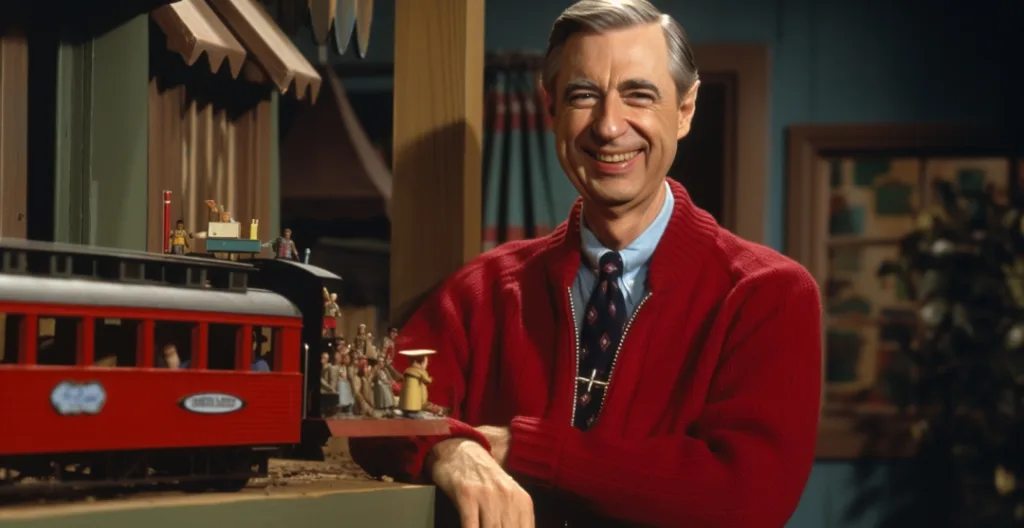
In a world often overshadowed by chaos and negativity, Fred Rogers stood out as a beacon of hope, compassion, and unconditional love.
Known to millions as “Mister Rogers,” he dedicated his life to nurturing the hearts and minds of children through his iconic television program, “Mister Rogers’ Neighbourhood.”
The show first aired on February 19, 1968, on the National Educational Television network (NET). It later moved to PBS when it replaced NET. The final episode was recorded on December 1, 2000. The series consisted of over 900 episodes, making it one of the longest-running children’s television shows in the United States. It held that record until it was surpassed by Sesame Street in 2003.
My oldest son Eliot, at the age of about five or six, was one of Fred’s biggest fans. Every day (until we left America in 1986), he watched Mr Rodgers on the TV, and wouldn’t miss an episode.
I’m sure he would agree, he owes much of his own gentle nature and thoughtful ways to what he learned from Mr Rodgers, and then later, from Sesame Street.
I was often away on business, so Mr. Rodgers and Big-Bird had to deputise for me on many an occasion. I hate to say it, but they probably did a far better job of setting young Eliot on life’s path, than I could have ever done.
However, the influence and impact of Fred Rogers reaches far beyond the realm of children’s television. His legacy continues to inspire and guide us, reminding us of the power of kindness, empathy, and the importance of human connection.
The Life and Times of Fred Rogers
Born on March 20, 1928, in Latrobe, Pennsylvania, Fred McFeely Rogers displayed a natural affinity for music and puppetry from an early age. He pursued his passion for music, graduating magna cum laude from Rollins College with a degree in Music Composition. Following his graduation, Rogers began working at NBC as a floor director for various shows, including “The Gabby Hayes Show” and “The Kate Smith Hour.”
In 1968, Fred Rogers debuted his own children’s television show, “Mister Rogers’ Neighborhood,” which would become his life’s work. The program, characterised by Rogers’ gentle demeanour and sincerity, featured puppetry, music, and real-life interactions with a diverse cast of characters.
Through simple yet profound messages, he addressed topics such as kindness, empathy, and emotional well-being, empowering children to navigate the complexities of life with grace and understanding.
At the core of Fred Rogers’ philosophy was the belief in the power of empathy. He understood that children, as well as adults, needed a safe space to express their emotions and fears.
Through his show, he taught children the importance of acknowledging and accepting their feelings, fostering emotional intelligence in a generation that often struggled with self-expression.
Fred Rogers’ empathy extended beyond the television screen. He was known to respond personally to every piece of fan mail he received, often spending hours crafting heartfelt responses to children and adults alike. He believed that every individual deserved to be heard, valued, and loved. This genuine care for others inspired countless people, creating a ripple effect of kindness in communities across the world.
Mr Rodgers addresses the United States Congress
At that time, the government was considering cutting funding for public broadcasting, which would have had a significant impact on educational programs like his.
In his testimony, Fred Rogers passionately defended the importance of public television and its positive impact on children. He spoke about the significance of nurturing young minds through meaningful and educational content, emphasizing the value of his show in promoting emotional well-being, understanding, and compassion.
During his testimony, Senator John O. Pastore, who chaired the subcommittee, initially seemed sceptical of the need for funding public broadcasting. However, as Fred spoke from the heart about the show’s message and purpose, he managed to captivate the committee. His genuine sincerity and passion left a lasting impression on everyone present, and his words ultimately helped secure the funding necessary to sustain public television.
Fred Rogers’ appearance before Congress remains an unforgettable moment in history, highlighting the power of genuine compassion and the profound impact that individuals like him can have in shaping public policy for the betterment of society.
His testimony is considered one of the most powerful pieces of testimony ever offered before Congress and helped to increase funding for PBS from $9 million to $22 million
In addition to promoting emotional well-being, Fred Rogers fearlessly tackled social issues on his show. In a time of racial tension, he invited Francois Clemmons, a gay African-American singer, to be a regular cast member, breaking barriers and promoting equality. Rogers addressed topics like divorce, death, and disability, fostering an environment of understanding and acceptance.
Fred Rogers’ life and work left an indelible mark on generations of children and adults alike. His legacy continues to be celebrated through educational programs, books, and documentaries. In 2018, a documentary entitled “Won’t You Be My Neighbour?” reminded the world of the lasting impact of Rogers’ message and his unwavering commitment to promoting kindness and empathy.
And in 2019, Tom Hanks played the leading role in a film called “A Beautiful Day in the Neiborhood”, which is loosely based on the true story of the friendship between Fred Rogers and journalist Tom Junod. I recommend it highly, as a very accurate portrayal of Fred by Tom Hanks.
Fred Rogers was a remarkable individual who devoted his life to nurturing the hearts and minds of children, teaching valuable life lessons and promoting empathy in a world often lacking in compassion. His gentle demeanour, contagious kindness, and unwavering commitment to creating a better world continue to inspire us to this day.
Probably we can all do a better job of cultivating compassion, fostering genuine connections, and spreading love and kindness in our own neighbourhoods.
Me, being a grumpy old man — I’m excused from all that.
”Kindness, compassion, and empathy.”
~ Fred Rodgers
Leave a Reply